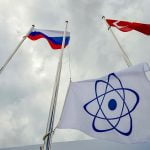The leaders of Latvia, Estonia, Lithuania, Hungary, Poland, Romania, Slovakia, and the Czech Republic have reportedly signed a letter objecting to enlarging the Nord Stream gas pipeline from Russia to Germany, bypassing Ukraine, according to Reuters. The eight EU-member states argued that Nord Stream 2 would have potentially destabilising geopolitical consequences.
A European Commission energy spokeswoman told New Europe on March 17 that she “cannot confirm receipt of the letter. Position on Nord Stream more than known by now”.
The copy of the letter was addressed to European Commission President Jean-Claude Juncker, according to Reuters. “The Nord Stream-2 project that is currently under preparation can pose certain risks for energy security in the region of central and eastern Europe,” the letter, dated March 7, says. “It would strongly influence gas market development and gas transit patterns in the region, most notably the transit route via Ukraine.”
Ukraine is a key transit route for Russian gas to Europe. European Commission Vice-President for Energy Union Maroš Šefčovič has repeatedly said Ukraine should remain an important transit country for gas supplies to Europe.
The Nord Stream-2 pipeline plans to double gas supplies shipped directly from Russia to Germany to 110 billion cubic metres per year. Russian gas monopoly Gazprom CEO Alexei Miller has said that the pipeline will boost Europe’s energy security.
Konstantin Simonov, the general director of Russia’s National Energy Security Fund, told New Europe on March 17 that he believes that Nord Stream 2 will be built. “The problem is very simple. If you block Nord Stream, it means that Ukraine will still be the transit country and it’s a question of trust for Europeans to Ukraine. And it’s a very serious question to Europeans: ‘Are you sure that Ukraine will be a stable transit country and are you sure Ukraine will guarantee the stable transit for the next five-seven or ten years or even more,’” Simonov asked.
“Nord Stream 2 is in my opinion the project which – if you are speaking about the point of Third package and idea of Brussels to enlarge infrastructure in Europe, to build new pipes – is absolutely logical from this point of view,” Simonov said.
“The question is what will be the attitude to Ukraine. Let’s imagine that Ukraine will stop the transit of gas to Europe. Is it possible? Of course, it is possible. For example, last month Ukraine stopped Russian trucks because of the political reasons,” he argued. “Next day they will decide that Ukraine must stop the transit of Russian gas.”
Simonov said that Gazprom does not want to pay penalties if Ukraine disrupts the transit of Russian gas to Europe.
Meanwhile, Sputnik quoted EU Head of Delegation to Russia Vygaudas Usackas as saying on March 18 that Nord Stream-2 “does not create new supply sources, but it is a commercial project and there are negotiations”. He added, however, that it should comply with EU law. And TASS quoted Shell Vice President Douglas Buckley as saying on the sidelines of the LNG 2016 Congress that “the fundamentals are good for projects such as Nord Stream expansion”.
follow on twitter @energyinsider







